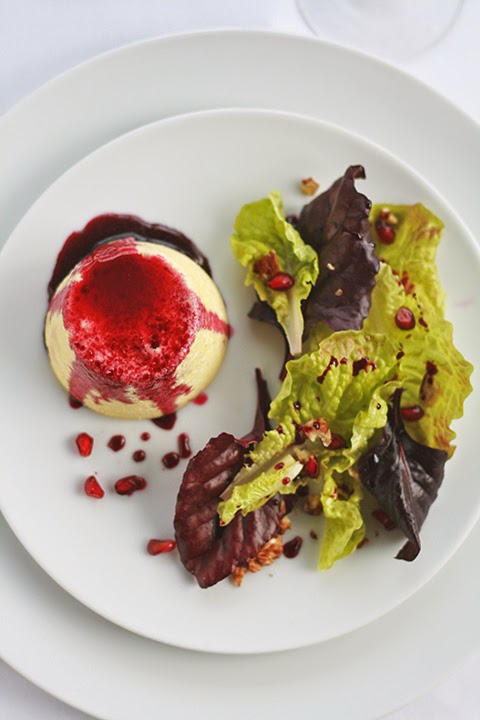Showing posts with label Christmas. Show all posts
Showing posts with label Christmas. Show all posts
Savory cheese flan, with walnuts and pomegranate sauce
Dec 17, 2014
Have you ever wondered what ancient Greek cooking would taste like? If ancient Greeks could have known that people in the future would be interested in their cuisine, they would most certainly have written down everything about their art of cooking.
During what we now call the ‘classical period’ ancient Greek civilization reached its peak. Tragic plays and Aristophanes’ comedies describe daily life including scenes around a table. Deipnosophists (from deipnon- dinner and sofos- wise) writing about the philosophic discussions taking place in rich people’s houses during gastronomic feasts described the menus in great detail. These sources inform us that Athenians had three daily meals out of which ‘’deipnon’’, late in the evening, was the last and most rich meal of the day. Dinner in modern Greece is still called ‘’deipno’’.
Their diet consisted of a great variety of fish, meat from both game and stock farming, grains such as barley and wheat and, of course vegetables, legumes and wild greens. Olive oil played the most important role in every aspect of their daily life, religious, pharmaceutical, cultural, or alimentary. Wine, a genuine Greek product, was consumed daily. Honey, initially collected from tree cavities before beekeeping methods were developed, was their sweetener. Ancient Greeks preferred a rather sweet cuisine similar to Chinese and Far East cooking today.
Of course many of the ingredients mentioned above were seasonal and accessed according to the economic and social status of citizens. I have read a few books about the ancient Greek diet and I thought that this Christmas, my inspiration should come from the flavors of our ancient cuisine.
This savory cheese flan would be an ideal first course for the Christmas season, combining flavors and textures with festive symbolism. It has a mousse-like texture that nicely compliments the crunchiness of the walnuts and the sweet and sour taste of the pomegranate sauce. Pomegranates symbolize fertility and prosperity and have always been connected with New Year’s festivities in Greece. At the moment the New Year arrives, we break open a pomegranate onto the door step for good luck throughout the year.
I wish a Merry Christmas to all of you.
Diples - crispy, festive bow ties with honey and walnuts
Dec 22, 2013
Here in the Peloponnese, along with the all time classic melomacarona and kourampiedes cookies, we also make diples (δίπλες) for the Christmas and New Year season. Diples, a word which means ‘’folded’’ in Greek, are made of thin sheet-like dough rolled into long, thin strips, folded, then fried in hot oil, and dipped in syrup. Folding the dough in hot oil demands a little experience; but you can make diples in all sorts of simple shapes, - the most common are bow ties and free form geometric.
Diples are served drizzled with honey, chopped walnuts and cinnamon.
In Crete the tradition is to make dairy and egg free diples, mostly for weddings. These are called xerotigana (ξεροτήγανα) and are made with really long thin zigzag strips of dough formed into spirals and of course served with honey and chopped walnuts . These last two ingredients symbolize prosperity, fertility, and joy in Greek tradition.
Subscribe to:
Comments (Atom)




